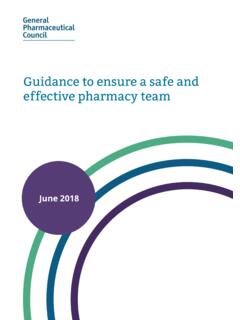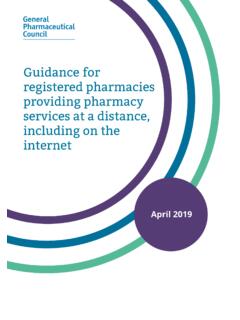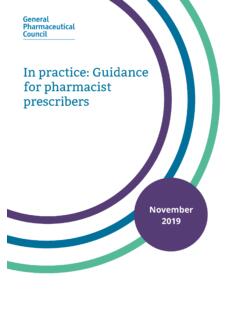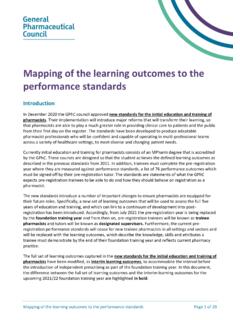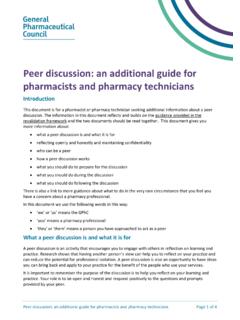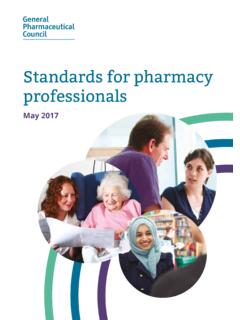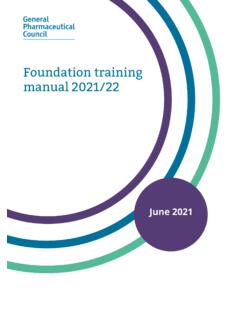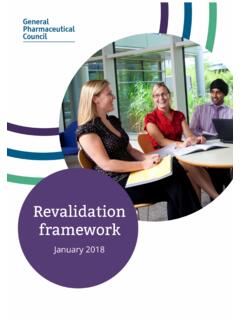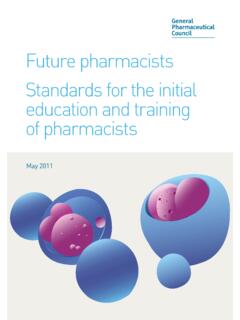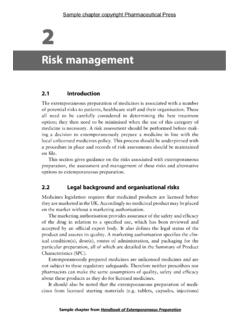Transcription of Guidance for registered pharmacies preparing unlicensed ...
1 Guidance for registered pharmacies preparing unlicensed medicines Revised August 2018 The text of this document (but not the logo and branding) may be reproduced free of charge in any format or medium, as long as it is reproduced accurately and not in a misleading context. This material must be acknowledged as General Pharmaceutical Council copyright and the document title specified. If we have quoted third party material, you must get permission from the copyright holder. Contact us at if you would like a copy of the document in another format (for example, in larger type or in a different language). General Pharmaceutical Council 2018 Contents About this Guidance .. 4 The scope of this Guidance .. 6 Introduction.
2 8 Guidance for registered pharmacies preparing unlicensed medicines .. 10 Risk assessment .. 10 Regular audit .. 11 Reactive review .. 11 Recall procedures .. 12 Accountability staff .. 12 Record keeping .. 12 Trained and competent 14 Training records .. 15 Measures to minimise 15 Hygiene control records .. 16 Ingredients .. 16 Quality assurance .. 16 Patient information .. 17 Specialist equipment and facilities .. 18 Maintenance logs .. 18 Other sources of information .. 19 Guidance for registered pharmacies preparing unlicensed medicines 4 About this Guidance This Guidance should be followed if an unlicensed medicine is prepared in a registered pharmacy. The preparation of an unlicensed medicine (for example unlicensed methadone, or menthol in aqueous cream) in a pharmacy is called extemporaneous preparation.
3 The Guidance should be read alongside the standards for registered pharmacies . These aim to create and maintain the right environment, both organisational and physical, for the safe and effective practice of pharmacy. By following this Guidance , the pharmacy will: demonstrate that it meets our standards, and provide assurances that the health, safety and wellbeing of patients and the public are safeguarded Responsibility for making sure this Guidance is followed lies with the pharmacy owner. If the registered pharmacy is owned by a body corporate , the directors have responsibility. Those responsible for the overall safe running of the pharmacy need to take into account the nature of the pharmacy and the range of services already provided and, most importantly, the needs of patients and members of the public.
4 The General Pharmaceutical Council is the regulator for pharmacists, pharmacy technicians and registered pharmacies in England, Scotland and Wales. Guidance for registered pharmacies preparing unlicensed medicines 5 As well as meeting our standards, the pharmacy owner must make sure they keep to all legal requirements, including medicines legislation, and health and safety, data protection and equalities legislation. Pharmacy owners should make sure that all staff, including non-pharmacists, involved in preparing unlicensed medicines are familiar with this Guidance . Individual pharmacy professionals are key to ensuring the safe preparation and supply of unlicensed medicines. Pharmacists and pharmacy technicians involved in preparing unlicensed medicines have a responsibility to provide medicines safely to patients, maintain the quality of their practice, keep their knowledge and skills up to date, and work within their professional competence.
5 We expect this Guidance to be followed. However, we also recognise that there can be a number of ways to meet our standards and achieve the same outcomes for patients that is, to provide safe treatment, care and services. If you do not follow this Guidance , you should be able to show how your alternative ways of working safeguard patients, identify and manage any risks, and meet our standards. In this document, when we use the term you , this means the pharmacy owner. In some limited circumstances (for example following death or bankruptcy), a representative can take the role of the pharmacy owner. In these cases, the appointed representative will be responsible for making sure these standards are met. Guidance for registered pharmacies preparing unlicensed medicines 6 The scope of this Guidance This Guidance applies only to the process of preparing1 an unlicensed medicine by (or under the supervision of) a pharmacist in a registered pharmacy in Great Britain, under the exemptions and circumstances described in the law2.
6 It applies whether this happens rarely, occasionally or is part of the core business of the registered pharmacy. This Guidance applies to all the following: the one-off preparation of an unlicensed medicine in accordance with a prescription for an individual patient the preparation of a stock3 of unlicensed medicines, (in anticipation of a prescription), which will later be supplied from the pharmacy, by or under the supervision of a pharmacist, against a prescription for an individual patient 1 This Guidance does not apply to unlicensed medicines that registered pharmacies have not prepared themselves, but have obtained from elsewhere such as (MS) licensed manufacturers, importers or distributors 2 Section 10 of the Medicines Act 1968 and Regulation 4 of the Human Medicines Regulations 2012 3 Preparation for stock at a pharmacy is acceptable as long as it is subsequently supplied by retail from that pharmacy or another pharmacy which is part of the same legal entity the preparation of methadone for supply in accordance with a prescription (either for immediate supply in accordance with the prescription, or initially as stock4 to be supplied from the pharmacy, by or under the supervision of a pharmacist, against a prescription at a later time)
7 The preparation of an unlicensed medicine based upon the pharmacist s judgement5 the preparation of an unlicensed medicine by, or under the supervision of, a pharmacist based on the specification of the patient If the activity is not covered by the exemptions set out in the law, you will need a Manufacturer s Specials (MS) licence from the Medicines and Healthcare products Regulatory Agency (MHRA). If the medicines are being prepared for animal use, the exemptions that allow this, and the parts of the law that apply, are found in the Veterinary Medicines Regulations 2013. The body that regulates animal medicines and issues authorisations to manufacturers of special veterinary medicinal products is the Veterinary Medicines Directorate (VMD).
8 4 Preparation for stock at a pharmacy is acceptable as long as it is subsequently supplied by retail from that pharmacy or another pharmacy which is part of the same legal entity 5An unlicensed medicine that is prepared with the intention of selling it over the counter (one that is not a prescription-only medicine) is often called a Chemist s Nostrum Guidance for registered pharmacies preparing unlicensed medicines 7 Throughout this document we use the terms preparing and preparation which refer to the extemporaneous preparation of a medicine from ingredients or starting materials. These terms are not intended to include the process of simply diluting or dissolving a product in a vehicle designed for that purpose as part of its marketing authorisation for example, adding a set amount of water to reconstitute an antibiotic powder.
9 Guidance for registered pharmacies preparing unlicensed medicines 8 Introduction The law6 sets out the restrictions on how human medicines are licensed, manufactured, advertised, administered, sold and supplied. Most of the medicines supplied from registered pharmacies are licensed medicines. Licensed medicines are those that have a valid Marketing Authorisation (MA) in the UK, and which are covered by an approval process overseen by the MHRA or the European Medicines Agency (EMA). The manufacturers who make or import these medicines in the UK are also regulated and licensed by the MHRA for compliance with EU Good Manufacturing Practice (GMP) standards and the strict conditions of their licence. You can find more information about the approval and inspection of manufacturers on the MHRA s website.
10 These arrangements mean that licensed manufacturers are making medicines to a regulated standard that is consistent throughout the industry. It also means that when medicines are used in line with their licence, they are: assured to a certain level of efficacy, quality and safety, and only available if they are effective Overall this means that the public, and patients, can have a high degree of confidence that 6 Medicines Act 1968 and the Human Medicines Regulations 2012 7 Regulations 46 of the Human Medicines Regulations 2012 appropriately prescribed licensed medicines are effective and meet the clinical needs of patients. As a rule, the law requires that only authorised (licensed) medicines should be made available and supplied ( placed on the market ).
